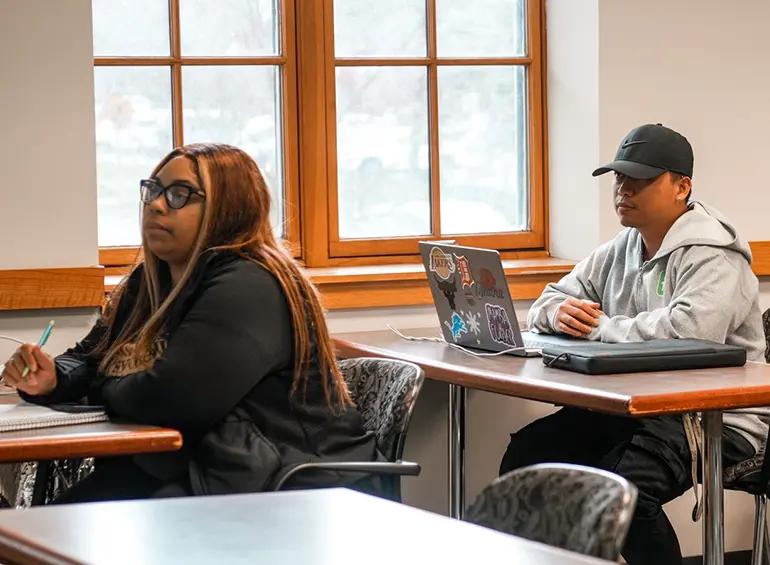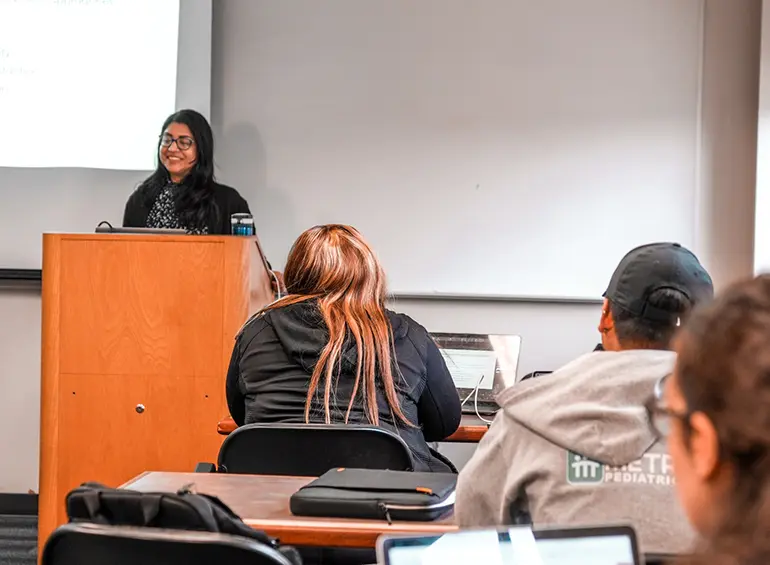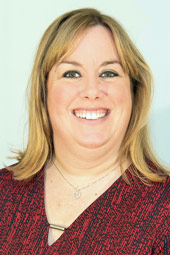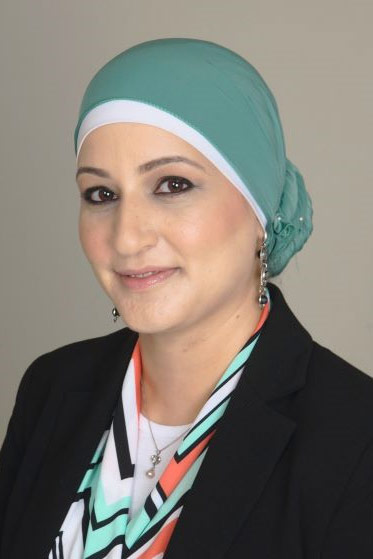Addiction Studies

Be a catalyst for change
Detroit Mercy's Addiction Studies program is among the nation's first and has been a forerunner in informing the national debate on education and training for substance use professionals.
What's New?
Complete the Post-Graduate Certificate in Addiction Studies virtually
The Post-Graduate Certificate in Addiction Studies is now available for completion virtually so that you can earn the certificate from wherever you are. The 18-credit-hour program is designed to be completed in one year and fulfills the educational requirements for state substance use certification for those interested in pursuing additional credentialing.
Applications are now being accepted for the Fall cohort. Information sessions will be held in March and May.
Find out more and register for a Virtual Information Session
ADS Programs

Bachelor of Science
The Bachelor of Science with a major in Addiction Studies provides enhanced undergraduate experience to students interested in pursuing a graduate degree in Counseling, Clinical Psychology or Social Work, while preparing you to work in the substance abuse field.

Minor: Addiction Studies
The 18-credit minor is perfect if you are majoring in Nursing, Psychology or Social Work or adjacent areas, such as Health Services Administration or Criminal Justice, and want to make yourself highly marketable by having advanced knowledge in addiction.

Post-Bachelor's Degree Certificate
Already possess a bachelor's degree? A post-degree certificate in Addiction Studies can help prepare you for entry-level positions in alcohol and drug treatment agencies.

Post-Master's Degree Certificate
For students who already possess a master's in a field related to Addiction Studies, a graduate certificate is an option if you are seeking advanced clinically focused academic work in the treatment of addiction.
![]()
Job Outlook
Job market for addiction specialists expected to grow 22% through 2031, according to the U.S. Bureau of Labor Statistics.
![]()
A Strong History
Detroit Mercy has been preparing addiction professionals for more than 50 years.
![]()
Career Outcomes
Our graduates are highly sought in the job market, with more than 80% employed in the substance use field within three months of graduation.
 After graduation, I plan on heading to grad school to become a substance abuse counselor along with attaining my master’s degree in therapy. My goal is to empower, encourage, motivate, uplift and instill in others hope for change. I am so very grateful to my professors, mentors and friends for believing in me and leading me in the right direction, because I am the future therapist.
After graduation, I plan on heading to grad school to become a substance abuse counselor along with attaining my master’s degree in therapy. My goal is to empower, encourage, motivate, uplift and instill in others hope for change. I am so very grateful to my professors, mentors and friends for believing in me and leading me in the right direction, because I am the future therapist.
— Precious Pollard
Undergraduate Programs
-
Major - Addiction Studies
Degree: Bachelor of Science
Major: Addiction Studies
Credits: 120If you want to be a catalyst to help empower individuals who struggle with addiction, you need the strong foundation that UDM's program can provide.
The Bachelor of Arts with a major in Addiction Studies will teach the knowledge and skills required when providing prevention, assessment, referral and treatment services for individuals and families who suffer from addictive disorders.

Careers
A majority of Addiction Studies graduates become employed in the addiction treatment field and/or are accepted into graduate school immediately following graduation.
While the focus of the program is addiction and behavioral disorder treatment, many graduates often become employed as prevention specialists and drug educators.Career Pathways
- Prevention Specialist
- Substance Abuse Specialist
- Case Worker
- Supervisor
Gain skills you didn't know you needed
Through a strong background in the humanities, you will find ways to reach your clients who are struggling and work with many professions to help change the structures of society that support addictive behavior. As a good listener, clear writer, introspective and critical thinker, you learn to advocate for your clients and programs and help the profession evolve.
Curriculum
The curriculum emphasizes alcohol and other drug addictions while exploring the broader range of addictive behaviors and the co-occurrence of other mental disorders with addiction. It is interdisciplinary and includes courses in the psychological and biological sciences and humanities, in addition to addiction studies. Find out more:
Download Sample Curriculum (pdf) ▶ Undergraduate Catalog Information ▶
Take a step today to move toward your future career in addiction studies.
- Ready to apply? Start your application now.
- Want to talk to someone? Email kaurva@udmercy.edu or Contact UDM Admissions.
- Have an associate's degree or some college credits? Transfer to UDM.
- Want to visit Detroit Mercy's campus? Register for a campus visit.
- Want to sign up to receive more information? Submit an inquiry form.
-
Minor - Addiction Studies
Detroit Mercy's minor in Addiction Studies complements the education and professional training from your major and prepares you to work effectively with individuals who are adversely affected by addictive disorders.
This 18-credit minor is an excellent option if you:
- are majoring in one of the primary or behavioral health professions, such as Nursing, Psychology or Social Work, and want to make yourself highly marketable by having advanced knowledge in addiction; or
- are pursuing a degree in adjacent areas, such as Health Services Administration or Criminal Justice, where knowledge and expertise in addictions and recovery is a helpful adjunct.

Substance Use Certification
The State of Michigan sponsors the Certified Alcohol and Drug Counselor credential (CADC). It is strongly recommended in this state and many others that any professional who counsels chemically dependent clients have this certification. The minor in Addiction Studies provides all the educational and internship hours required for the CADC, should you choose to apply for it. Additional requirements (examination and clinical hours) are your responsibility.
Post-Degree Certificates
-
Post-Bachelor's Degree Certificate
If you have already attained a bachelor’s degree in a major (e.g., Criminal Justice, Psychology or Social Work) related to the field of Addiction Studies, a post-degree certificate will equip you with 18-credit hours of additional information that will prepare you for entry-level positions in alcohol and drug treatment agencies. In addition, the certificate meets the minimum educational requirements to initiate a development plan for the Certified Alcohol and Drug Counselor (CADC) credential granted by the Michigan Certification Board for Addiction Professionals (MCBAP).
-
Post-Master's Degree Certificate
If you already possess your master's degree in a related discipline but want to further specialize in the field of addiction, the post-graduate certificate in addition studies is one of Detroit Mercy’s unique certificate programs.
Typically, individuals with a master’s degree in Clinical Psychology, Counseling, Social Work or Nursing pursue the certificate; however, individuals with a master’s degree in other major disciplines (e.g., Dentistry, Criminal Justice or Health Administration) may also be interested. The 18-credit-hour post-graduate certificate in Addiction Studies requires approximately one year to complete.Substance Use Certification
The post-graduate certificate in Addiction Studies fulfills the academic and internship requirements for the Certified Advanced Alcohol and Drug (CAADC) credential authorized by the State of Michigan. The CAADC is compulsory for professionals who specialize in the clinical treatment of substance use.
Complete the UDM Post-Graduate Certificate in Addiction Studies Virtually
The Post-Graduate Certificate in Addiction Studies is now available for completion virtually so that you can earn the certificate from wherever you are. The Post-Graduate Certificate is ideal for practicing clinicians wishing to specialize in addiction and/or further enhance their clinical practice, primary and oral health professionals seeking advanced training in substance use, and other professionals interested in pursuing specialized knowledge in addiction (e.g., law enforcement).
The 18-credit-hour program is designed to be completed in one year and fulfills the educational requirements for state substance use certification for those interested in pursuing additional credentialing. Applications are now being accepted for the Fall 2025 cohort.
Register for a Virtual Information Session
Wednesday, Jan. 14 at Noon
Wednesday, Feb. 25 at 6 p.m.
Wednesday, March 25 at Noon
Register for an Information Session
For questions related to the Post-Graduate Certificate in Addiction Studies, contact:
- Director Varinder Kaur at kaurva@udmercy.edu or
- Department Chair Nancy Calleja at calleyng@udmercy.edu
 I chose addiction studies because I want to help adolescents and young adults stay away from using and save those who have already started.
I chose addiction studies because I want to help adolescents and young adults stay away from using and save those who have already started.
— Bradley Collins
Faculty

Kelli Anderson
Assistant Professor of Counseling
Director of Clinical Mental Health Counseling Program
313-993-1227
anderskb@udmercy.edu

Krystal Armstrong
Senior Adjunct Instructor
313-578-0392
armstrkr@udmercy.edu

Regina Bell
Counseling Clinic Manager
313-993-1626
leerc@udmercy.edu

Nancy G. Calleja
Professor of Counseling
*
Department Chair, Department of Counseling & Addiction Studies; Department of Social Work
Director of Addiction Counseling
313-578-0436
calleyng@udmercy.edu

Tahani Dari
Associate Professor of Counseling
Director of School Counseling
313-993-1165
darith@udmercy.edu

Varinder Kaur
Assistant Professor
Director of Addiction Studies Program
313-578-0392
kaurva@udmercy.edu

Daniel Lawrence
Assistant Professor of Counseling
313-993-1438
lawrendh@udmercy.edu
Administrative Support

Valerie Williams
Administrative Assistant
313-578-0392
williavw@udmercy.edu
